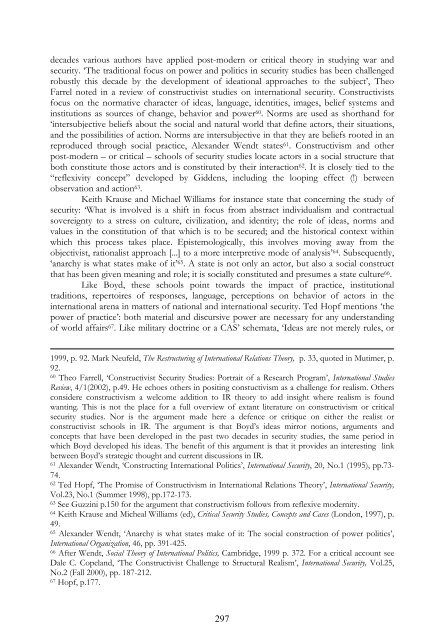Science, Strategy and War The Strategic Theory of ... - Boekje Pienter
Science, Strategy and War The Strategic Theory of ... - Boekje Pienter
Science, Strategy and War The Strategic Theory of ... - Boekje Pienter
You also want an ePaper? Increase the reach of your titles
YUMPU automatically turns print PDFs into web optimized ePapers that Google loves.
decades various authors have applied post-modern or critical theory in studying war <strong>and</strong>security. ‘<strong>The</strong> traditional focus on power <strong>and</strong> politics in security studies has been challengedrobustly this decade by the development <strong>of</strong> ideational approaches to the subject’, <strong>The</strong>oFarrel noted in a review <strong>of</strong> constructivist studies on international security. Constructivistsfocus on the normative character <strong>of</strong> ideas, language, identities, images, belief systems <strong>and</strong>institutions as sources <strong>of</strong> change, behavior <strong>and</strong> power 60 . Norms are used as shorth<strong>and</strong> for‘intersubjective beliefs about the social <strong>and</strong> natural world that define actors, their situations,<strong>and</strong> the possibilities <strong>of</strong> action. Norms are intersubjective in that they are beliefs rooted in anreproduced through social practice, Alex<strong>and</strong>er Wendt states 61 . Constructivism <strong>and</strong> otherpost-modern – or critical – schools <strong>of</strong> security studies locate actors in a social structure thatboth constitute those actors <strong>and</strong> is constituted by their interaction 62 . It is closely tied to the“reflexivity concept” developed by Giddens, including the looping effect (!) betweenobservation <strong>and</strong> action 63 .Keith Krause <strong>and</strong> Michael Williams for instance state that concerning the study <strong>of</strong>security: ‘What is involved is a shift in focus from abstract individualism <strong>and</strong> contractualsovereignty to a stress on culture, civilization, <strong>and</strong> identity; the role <strong>of</strong> ideas, norms <strong>and</strong>values in the constitution <strong>of</strong> that which is to be secured; <strong>and</strong> the historical context withinwhich this process takes place. Epistemologically, this involves moving away from theobjectivist, rationalist approach [...] to a more interpretive mode <strong>of</strong> analysis’ 64 . Subsequently,‘anarchy is what states make <strong>of</strong> it’ 65 . A state is not only an actor, but also a social constructthat has been given meaning <strong>and</strong> role; it is socially constituted <strong>and</strong> presumes a state culture 66 .Like Boyd, these schools point towards the impact <strong>of</strong> practice, institutionaltraditions, repertoires <strong>of</strong> responses, language, perceptions on behavior <strong>of</strong> actors in theinternational arena in matters <strong>of</strong> national <strong>and</strong> international security. Ted Hopf mentions ‘thepower <strong>of</strong> practice’: both material <strong>and</strong> discursive power are necessary for any underst<strong>and</strong>ing<strong>of</strong> world affairs 67 . Like military doctrine or a CAS’ schemata, ‘Ideas are not merely rules, or1999, p. 92. Mark Neufeld, <strong>The</strong> Restructuring <strong>of</strong> International Relations <strong>The</strong>ory, p. 33, quoted in Mutimer, p.92.60 <strong>The</strong>o Farrell, ‘Constructivist Security Studies: Portrait <strong>of</strong> a Research Program’, International StudiesReview, 4/1(2002), p.49. He echoes others in positing constuctivism as a challenge for realism. Othersconsidere constructivism a welcome addition to IR theory to add insight where realism is foundwanting. This is not the place for a full overview <strong>of</strong> extant literature on constructivism or criticalsecurity studies. Nor is the argument made here a defence or critique on either the realist orconstructivist schools in IR. <strong>The</strong> argument is that Boyd’s ideas mirror notions, arguments <strong>and</strong>concepts that have been developed in the past two decades in security studies, the same period inwhich Boyd developed his ideas. <strong>The</strong> benefit <strong>of</strong> this argument is that it provides an interesting linkbetween Boyd’s strategic thought <strong>and</strong> current discussions in IR.61 Alex<strong>and</strong>er Wendt, ‘Constructing International Politics’, International Security, 20, No.1 (1995), pp.73-74.62 Ted Hopf, ‘<strong>The</strong> Promise <strong>of</strong> Constructivism in International Relations <strong>The</strong>ory’, International Security,Vol.23, No.1 (Summer 1998), pp.172-173.63 See Guzzini p.150 for the argument that constructivism follows from reflexive modernity.64 Keith Krause <strong>and</strong> Micheal Williams (ed), Critical Security Studies, Concepts <strong>and</strong> Cases (London, 1997), p.49.65 Alex<strong>and</strong>er Wendt, ‘Anarchy is what states make <strong>of</strong> it: <strong>The</strong> social construction <strong>of</strong> power politics’,International Organization, 46, pp. 391-425.66 After Wendt, Social <strong>The</strong>ory <strong>of</strong> International Politics, Cambridge, 1999 p. 372. For a critical account seeDale C. Copel<strong>and</strong>, ‘<strong>The</strong> Constructivist Challenge to Structural Realism’, International Security, Vol.25,No.2 (Fall 2000), pp. 187-212.67 Hopf, p.177.297
















